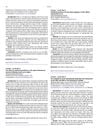Search
for
Sort by
Research
300-330 / 1000+ results
research Agomelatine May Alleviate Valproate-Induced Hair Loss
Agomelatine might help stop hair loss caused by valproate.

research Experimental and Clinical Pharmacology of Ziziphus Jujuba Mills
Ziziphus jujuba Mills may have health benefits, but more research is needed to confirm its safety and effectiveness.

research Feline Dermatophytosis: Contagion, Diagnosis, and Treatment
Combining systemic and topical treatments, guided by weekly fungal cultures, effectively treats cat ringworm.

research Severe Infliximab-Induced Alopecia and Scalp Psoriasis in a Woman with Crohn’s Disease: Dramatic Improvement After Drug Discontinuation and Treatment with Adjuvant Systemic and Topical Therapies
Stopping the medication infliximab and starting new treatments helped a woman's hair grow back and improved her scalp condition.

research Topical Use of Systemic Drugs in Dermatology: A Comprehensive Review
Using systemic drugs as creams for skin conditions shows promise, but more research is needed to confirm their effectiveness and safety.

research Hormone Treatment for the Adult Transgender Patient
Hormone therapy is safe and effective for transgender adults, but requires regular monitoring and mental health support.

research Preclinical Studies of a Novel Polyherbal Phyto-Complex Hair Growth Promoting Cream
The herbal cream was found to be a safe and effective alternative for hair growth, similar to minoxidil.

research Human Teeth Are Useful Even After They Are Shed: Why Discard Them?
Baby teeth stem cells can potentially grow organs and treat diseases.

research Hormonal Therapies for Acne: A Comprehensive Update for Dermatologists
Hormonal therapies effectively treat acne and improve quality of life.

research Ligand-Independent Actions of Vitamin D Receptor
The vitamin D receptor helps maintain hair and bone health even without binding vitamin D.

research Bacillus Subtilis Promotes Plant Phosphorus Acquisition Through Phosphorus Solubilization and Stimulation of Root and Root Hair Growth
Bacillus subtilis helps plants get more phosphorus and grow better roots.

research Does Propecia Cause More Harm Than Good: Assessing Reproductive and Non-Reproductive Effects of Finasteride on Male Health
Finasteride treats hair loss but may cause low libido, erectile issues, and depression.

research Comparative Management Methods for Adolescents With Polycystic Ovarian Syndrome: A Systematic Review
Individualized treatment plans, including lifestyle changes and specific medications, are crucial for managing PCOS in adolescents.

research Fleece Traits and Important Physical Properties of Hair Fibers in Lori Goats
Adding bentonite clays to goat diets increased milk yield, periwinkle shell improved chicken egg production, and vaccination increased muscle area and carcass yield in calves.

research Impact of Hair Damage on the Penetration Profile of Coconut, Avocado, and Argan Oils into Caucasian Hair Fibers
Different oils affect hair flexibility and strength, with their impact varying on whether hair is virgin or bleached.

research Application of Mesenchymal Stem Cells for Anti-Senescence and Clinical Challenges
Mesenchymal stem cells could help treat aging-related diseases better than current methods.

research Recent Tissue Engineering Approaches to Mimicking the Extracellular Matrix Structure for Skin Regeneration
New materials that better mimic natural skin structure could improve healing, especially for chronic wounds.
research Bone Health Risks Associated with Finasteride and Dutasteride Long-Term Use

research Hair Straightening: Techniques, Chemicals, and Evolution
Hair straightening methods have advanced to improve effectiveness and reduce damage, but still rely on heat and chemicals.

research Essential Oils for Hair Health: A Critical Mini-Review of the Current Evidence and Future Directions
Essential oils may help hair health but lack strong scientific proof and can cause allergic reactions.

research Classification of Surgical Therapies in Vitiligo
Surgical therapies for vitiligo vary in effectiveness, with combination therapy and medical tattooing recommended for better results.

research The Effects of Sodium Metasilicate on Spinal Motoneuron Recovery Following Sciatic Nerve Injury
Sodium metasilicate improved spinal motoneuron recovery after sciatic nerve injury in rats.

research Challenges in Treatment of Patients With Non-Classic Congenital Adrenal Hyperplasia
Treating non-classic congenital adrenal hyperplasia is complex because the benefits of hormone treatment must be weighed against potential health risks.

research Responses to Dietary Supplementation With Field Bean in Production Indices, Mohair Growth and Hormonal Parameters in Transition Angora Goats
Field bean supplementation improved mohair growth and kid growth in Angora goats but didn't prevent weight loss after giving birth.
research Investigation, Treatment, And Monitoring Of Late-Onset Hypogonadism In Males: ISA, ISSAM, And EAU Recommendations
Men with low testosterone should be carefully evaluated and monitored before and during treatment.

research Cross-Sex Hormone Therapy in Australia: The Prescription Patterns of Clinicians Experienced in Adult Transgender Healthcare
Australian doctors experienced in adult transgender healthcare mostly prescribe intramuscular testosterone and oral estradiol, recommend mental health assessments before hormone therapy, and support improved training and guidelines.

research Formulation and Evaluation of Herbal Hair Oil
Herbal hair oil made with natural ingredients helps reduce hair loss, dandruff, and graying.

research New and Consolidated Therapeutic Options for Pubertal Induction in Hypogonadism: In-Depth Review of the Literature
There are various effective hormone treatments for puberty induction in boys and girls with hypogonadism, and starting treatment early is important.

research Anti-Aging Potential of Platelet Rich Plasma: Evidence from Osteoarthritis and Applications in Senescence and Inflammaging
PRP may help with aging and osteoarthritis, improving tissue repair and reducing surgery risk.